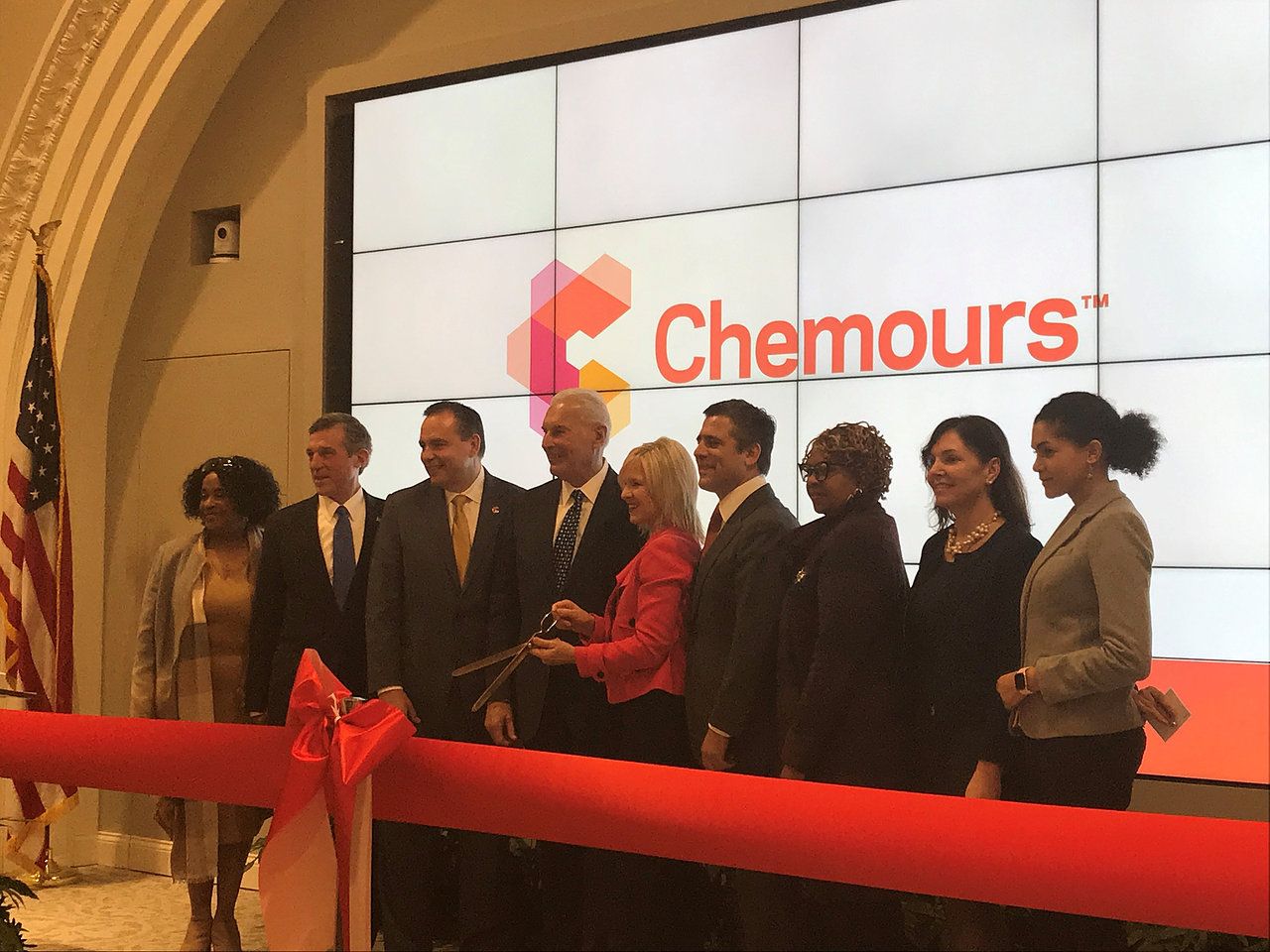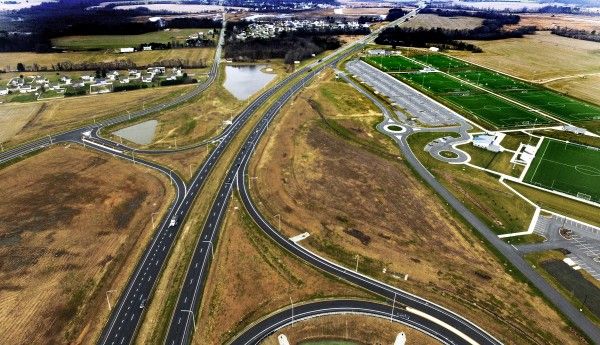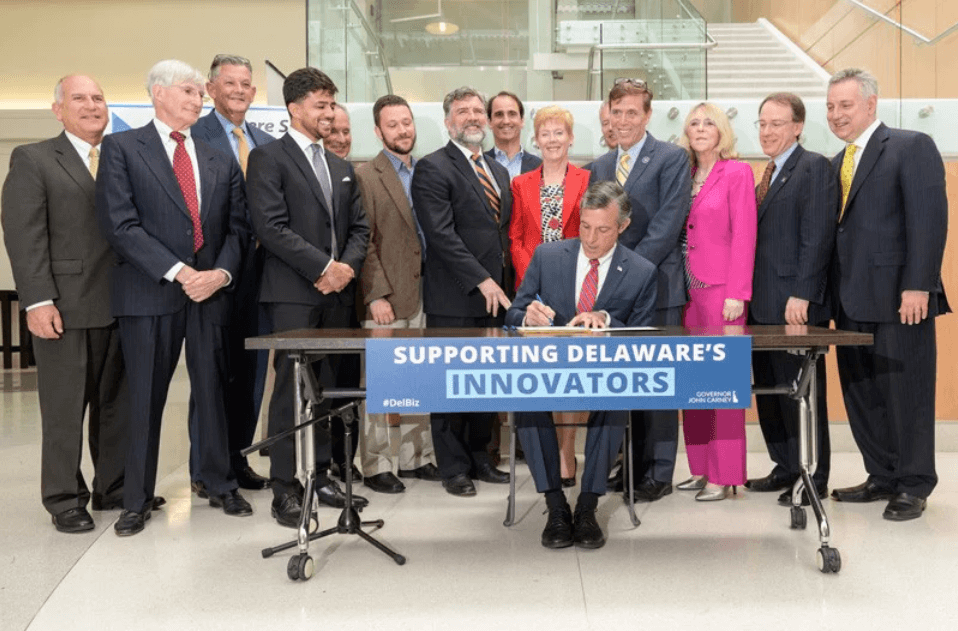Around 1,000 business, political and nonprofit leaders gathered at the Chase Center on the Riverfront in Wilmington on Jan. 7 for the Delaware State Chamber of Commerce’s annual dinner, an event that organizers called the state’s top networking event of the year.
The 182nd annual DSCC dinner featured awards for top achievers in business; an extended corporate promotion by the head of Chemours and a speech by Gov. John Carney highlighting the state’s strong economy.
But mostly it was a golden opportunity for executives to mingle, renew old acquaintances and enjoy being part of Delaware’s tight-knit business community.
“In this room right now, it’s a who’s who of Delaware,” said Ryan Kennedy, vice president of marketing for the Newport developer Harvey Hanna & Associates. “You can go to every single table out of the 200 or so tables that are here, and there’s a relationship. This is a good event to strengthen those relationships but also kick-start a new year of working together.”
As attendees sat down for dinner, Kennedy said the event creates common ground in the business community.
“Everyone in this room has something to do with the Delaware way and the Delaware story, and that’s something we like to be a part of,” he said.
The chamber’s prestigious DSCC Marvel Cup – whose recipient each year is a closely guarded secret until it is presented at the dinner — was awarded to the Hon. Joshua Martin and his wife Cynthia Primo Martin for their outstanding contributions to Delaware. Joshua Martin is a former Superior Court judge and chief executive of Verizon Delaware. Cynthia Martin is a retired nonprofit executive and founder of Trustees of Color, a nonprofit focused on board diversity.
The event also presented the Dick DiSabatino Award to Joseph DiPinto, a former State Representative, member of Wilmington City Council, and Director of Wilmington’s Office of Economic Development. The rarely given award, last presented in 2013, recognizes an individual who has helped to shape opinion and public policy.
Former Delaware Representative Roger Roy, presenting the award, called DiPinto “a man with a strong intellect and a healthy sense of humor. He is a Republican that didn’t just talk about bipartisan cooperation, he lived it.”
Budget surplus
Carney said the dinner for him marks the opening day of the new legislative season, which he predicted this year would be an “interesting” one, in which lawmakers would consider how to plan for a tighter state budget when the economy is not as strong as it is now, with a 3.8 percent jobless rate and a budget surplus of almost $200 million, compared with a deficit only two years ago.
“There is a lot of good news to report,” Carney said, including the expansion of the Port of Wilmington, and the development of industrial sites in the Coastal Zone, where the Delaware Prosperity Partnership has clinched eight agreements to create some 1,900 jobs.
“The budget surplus will create a different set of challenges,” he said. “We need to make the right decisions so we are prepared for when the economy turns the other way again.”
Government can create the right conditions for economic growth by minimizing the time it takes business to obtain permits from state agencies, said James DeChene, the group’s senior vice president for government relations.
Businesses seeking to move into Delaware or expand existing operations would like to get permits such as environmental approvals for new developments within six months of application whereas it can take as long as three years, DeChene said in an interview.
“That seems to be the industry standard for site selectors when they are pitching states or locations for their clients,” he said. “They want and need a six-month process from beginning the process to when they can have a shovel in the ground.”
DeChene argued that Delaware is in a good position to achieve the six-month permit goal because it’s a small state with good communications between the state and county governments that control the permitting process. “This is an opportunity for us to really excel,” he said.
Chemours checks in
Keynote speaker Mark Vergnano, president and CEO of The Chemours Company, outlined the chemical company’s efforts to remake itself after being written off by some observers as destined to fail when it launched as a spinoff of Dupont in July 2015.
After the stock lost about three-quarters of its value in the first year of trading, a restructuring program that included job cuts is turning the company around to the point where it has given shareholders a return of 127 percent in the last fiscal year, Vergnano said.
Reasons for the turnaround include a corporate culture that asks employees to take ownership, he said. “We encourage our employees at every level to act like they own the company. Our values are not words on a website.”
At a pre-dinner gathering, Jason Danner, Senior Vice President for Kelly Benefit Strategies, a benefits consultant, said the event draws anyone who wants to connect with the state’s commercial, political, and charitable establishment.
“I think it’s something that, anybody who’s involved in Delaware wants to be a part of the chamber dinner every year,” he said. “Delaware is a unique state, and I think that’s what brings everybody together.”













